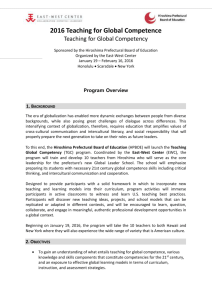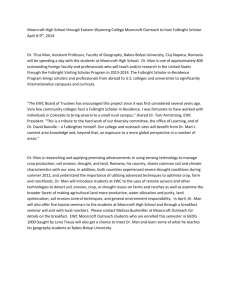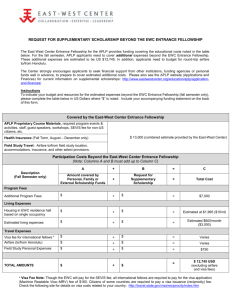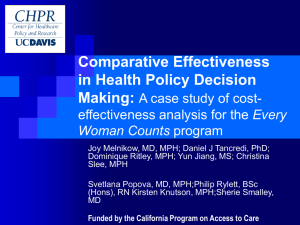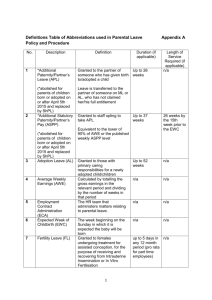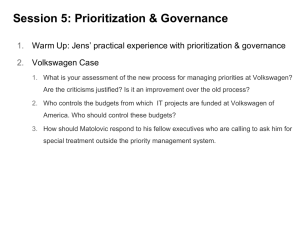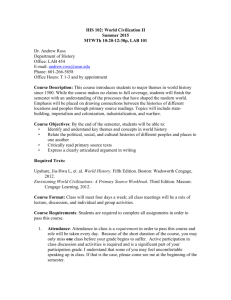EWCs in the new Member States
advertisement
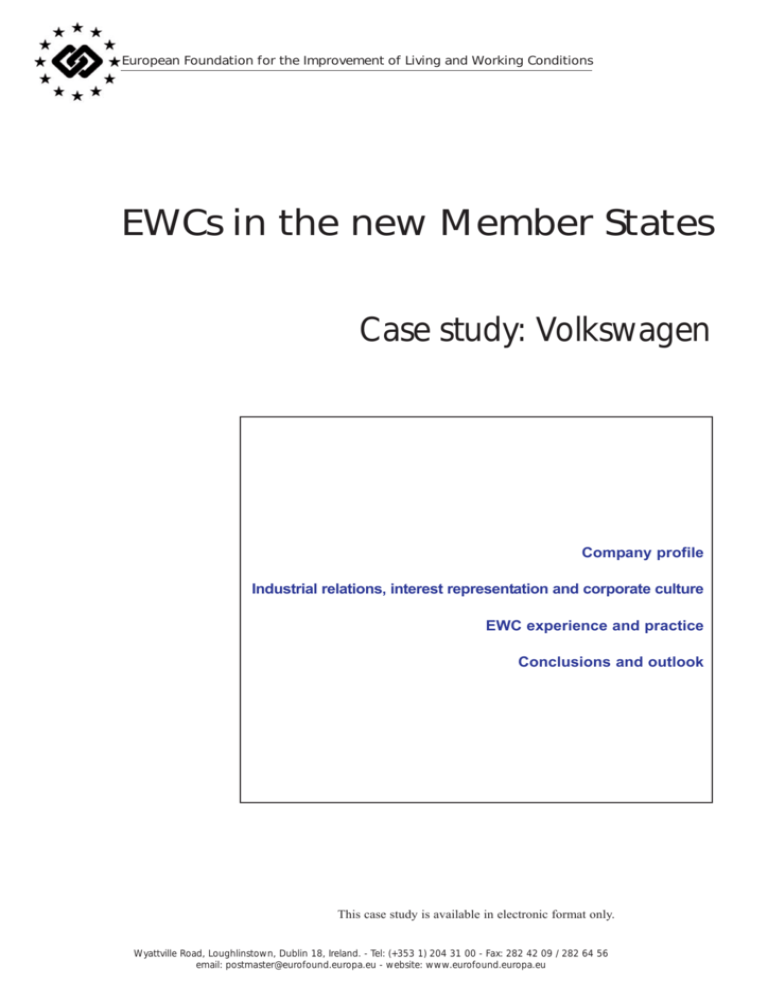
European Foundation for the Improvement of Living and Working Conditions EWCs in the new Member States Case study: Volkswagen Company profile Industrial relations, interest representation and corporate culture EWC experience and practice Conclusions and outlook This case study is available in electronic format only. Wyattville Road, Loughlinstown, Dublin 18, Ireland. - Tel: (+353 1) 204 31 00 - Fax: 282 42 09 / 282 64 56 email: postmaster@eurofound.europa.eu - website: www.eurofound.europa.eu This case study is based on interviews carried out in the Czech Republic and Slovakia between March and June 2006 with national members of the Volkswagen EWC in both countries, as well as with management representatives. Additional information was delivered by the EWC headquarters and by a Polish EWC member who took part in the expert workshop in the context of the research project on 19 June 2006 in Warsaw. Company profile General information about the company The Volkswagen group, with headquarters in Wolfsburg, Germany, is one of the leading car manufacturers in the world, with a share in global passenger car production in 2005 of 9% (5.2 million passenger car vehicles), making the company the world’s fourth largest car producer. Volkswagen is organised into two main groups of branches: the Volkswagen branch (with VW, Skoda, VW commercial vehicles, Bugatti and Bentley) and the Audi branch (with Audi, Seat and Lamborghini). Volkswagen is a joint stock company with a major German influence: the federal state of Lower Saxony is the most important single shareholder (with more than 13%) after Porsche, which bought a 22% share in 2005. At the end of 2004, the global workforce of Volkswagen was about 345,000, with nearly half of these employees working in Germany (163,500). Volkswagen in the Czech Republic and Slovakia With a total of some 42,000 employees, the Central and Eastern European region, and in particular the New Member States (NMS) of the European Union, is the most important production area for the Volkswagen group. The Czech Republic and Slovakia are the two most important countries for production. Volkswagen also has major production sites in Poland (Volkswagen-Poznan, Volkswagen Motor Polska and Sitech, with a total of 6,900 employees) and in Hungary (Audi Hungária in Györ, with 5,100 employees). Czech Republic Volkswagen started to invest in the Czech Republic in the traditional Czech car manufacturer Skoda in 1991. This was the first major investment of the company in the then acceding countries and the company invested much in the modernisation of production technologies and infrastructure. Today, Volkswagen is the 100% owner of Skoda and the Czech brand is one of the most successful VW group’s car brands. Skoda is also one of the most successful companies in the Czech economy and the biggest employer in the country. It has an excellent image on the Czech labour market and was selected as ‘Best employer of the year’ on several occasions. It is an attractive employer, not only for high wages but also for a wide range of social benefits and other incentives. Today, Skoda Auto a.s. is the only carmaker (‘Endproduzent’) in the Czech Republic. The company has a workforce of about 26,000 employees (including about 4,000 ‘leased employees’ with temporary contracts, hired by job agencies), located in three plant sites. The largest plant is at Mladá Boleslav and employs about 22,000 people; the Kvasiny site in 2006 employs about 1,700 people; and the Vrchlabi site employs about 1,100 people. Slovakia The Volkswagen group established its subsidiary in Slovakia as a joint venture named Volkswagen Bratislava Ltd. by buying 80% of the state-owned Slovak Bratislavské automobilové závody (BAZ) in 1991. In 1999, the company became a shareholder company and is now named VW Slovakia. © European Foundation for the Improvement of Living and Working Conditions, 2006 1 EWCs in the new Member States Volkswagen invested heavily in the Bratislava plant and the production of different types of cars and models was continuously increased. While in 1993 only roughly 3,000 cars were completed, in 2005 the number had grown to more than 210,000 and the Bratislava plant is now the most important site for assembling the Volkswagen and Audi off-road models (Tuareg, Q7 and also the chassis of the Porsche Cayenne). The production of the off-road models is very labourdemanding and intensive. Also, parts of the Polo and Golf production are located in Bratislava. Beside passenger cars, Volkswagen also produces gearboxes (since 1994) and car components (since 1995 for VW, Audi and Seat, and also for Porsche and British Leyland) and the output has greatly increased in recent years. VW Slovakia has two main production sites – in Bratislava (complete car production and assembling) and Martin (gearboxes) – with a total number of employees at the end of 2005 of 8,100. About 85% of the workforce are production/assembly workers, while 15% are technicians and administrative employees. Only 6% of employees are women. Employment reached its peak level in 2003, with 9,200 workers, after which a slight decrease took place. Industrial relations, interest representation and corporate culture Czech Republic Although there are some minor trade union organisations with only a few members, the most important and dominant trade union organisation at Skoda is the plant organisation of the Czech Metalworkers’ Trade Union, OS KOVO (see Table 1 for summary). This is also the biggest and most powerful trade union organisation in the Czech Republic. The chairman of the plant trade union organisation is also a member of the supervisory board of Skoda Auto a.s. Trade unions play an important role in the Skoda corporate culture and have been doing so since the original investment decision. When the Czech government decided to privatise Skoda, it was OS KOVO that actively supported the Volkswagen group as the investor of choice. The trade union even threatened to go on strike if another decision was taken. The cooperative corporate culture, which is built on strong trade union-organised employee involvement, is also supported by the Volkswagen group, which itself has a strong culture of employee co-management and codetermination (50% employees on the supervisory board). However, cooperative and dialogue-orientated corporate culture does not eliminate conflict when it comes to collective bargaining. In fact, Skoda is one of the very few Czech companies with a record of collective action. For example, the last collective bargaining round in March 2005 culminated in a two-hour strike at all three production sites in the Czech Republic. The special role of the trade unions in corporate culture at Skoda is also illustrated by a very high trade union organisation rate. On average, the membership rate was 67% at the end of 2005 and in Kvasiny and Vrchlabi, which are production sites with predominantly blue-collar workers, the rate was even higher – up to 85%. Since, according to the Czech industrial relations system, the plant level is the most important level of collective bargaining and also according to trade union policy in general, about 75% of membership fees remain in the plant-level trade union organisation; only 25% are transferred to the national union organisation level. This means that resources and material conditions of interest representation at Skoda Auto are very good and allow for a high quality of work, including external expertise and support. 2 © European Foundation for the Improvement of Living and Working Conditions, 2006 Volkswagen Slovakia As in the Czech Republic, employee representation in Slovakia is organised by trade unions only (see Table 1 for summary). There is one trade union organisation, which was established soon after the VW subsidiary in Slovakia started its operation in 1992. It is a member of the sectoral trade union KOVO (Metal). About 70% of employees are members of one of the five trade union organisational units in Bratislava (one of them represents white-collar workers) and of the trade union unit at the gearbox plant in Martin. No works council currently operates in VW Slovakia. (However, in the initial stage of operation, the VW management intended to establish a German-type works council in VW Slovakia.) Almost daily communication takes place between company management representatives and the chairs of the trade unions. Collective bargaining is regular and collective agreements used to be signed for one or two years. Trade union representatives are invited to the meetings of the VW Slovakia board of directors and they have regular meetings with personnel management. They are also members of several joint committees, e.g. for occupational health and safety issues, social policy, company catering. As far as the relationship between management and trade unions is concerned, both parties assess it as good, constructive and cooperative. Common VW business standards were implemented for industrial relations in VW Slovakia. Regular weekly meetings take place between management and trade union representatives, and meetings can also be called at very short notice if required. No special problems were identified between the social partners in VW Slovakia. Employee representation by the trade unions is considered satisfactory by both parties interviewed. Also, according to the interviewees, there are no proposals or plans to improve the current form of employee representation, participation, information and consultation practice in VW Slovakia. Table 1: Profile of Volkswagen industrial relations in Czech Republic and Slovakia Features Czech Republic Slovakia Investment type Brownfield Brownfield Number and size of workplaces 1 major and 2 smaller production sites 1 major and 1 smaller production site Number of employees 26,000 8,100 Profile of workforce Assembly work; most employees with vocational training degrees Assembly work; most employees with vocational training degrees, 15% technicians/administrative workers Type of interest organisation Dominated by one trade union Dominated by one trade union Trade union structure Trade union plant organisation Trade union plant organisation, 5 organisational units in Bratislava and 1 in Martin Union membership and coverage 67% on average; in smaller production sites up to 85% Approx. 70% Board-level representation Yes No, but taking part in board of directors' meetings as observers Coordination of collective bargaining Yes Yes Source: Authors © European Foundation for the Improvement of Living and Working Conditions, 2006 3 EWCs in the new Member States EWC experience and practice EWC profile The Volkswagen EWC is a very special case for several reasons, including its foundation process, operational aspects and position within the company’s national and international structure of interest representation. Founded in 1990 (although the installation agreement according to Article 13 is dated 1992), the European Volkswagen Group Works Council was established even before the EU Directive on European Works Councils came into force. The impetus for this step was twofold. Firstly, after the acquisition of Seat in Spain, employees were confronted with parallel production facilities and the threat that production might be moved from one plant to the other. Secondly, the foundation of the EWC did not begin from the scratch, but was rooted in an active trade union cooperation with union organisations of Volkswagen subsidiaries all over the world, most notably in Brazil and South Africa. In light of this, Volkswagen was not only a pioneering actor in the field of EWC development, but also in the creation of global institutions of information and consultation. In 1999, the company formally established the first ‘World Works Council’ (WWC) and both it and the VW EWC are closely connected to each other (e.g. joint annual meetings; most VW EWC members are also members of the WWC; the chairman of the VW EWC is also the chairman of the WWC). The Volkswagen EWC agreement has been revised several times in the context of restructuring and acquisitions (in 1992, 1995, 1996, 1998 and 1999). In order to establish an effective and operable institution, the number of delegates was kept small. Currently, the EWC has only 25 members (from eight countries), with a composition organised along countries and products/brands (see Table 2). Composition of the EWC is not based strictly on employment shares of the various countries/branches, but also takes into account the existence of one or more different VW brands. For example, Spain is represented by a total of five delegates (three delegates for Seat and two for VW Navarra), while the Czech Republic and Skoda ‘only’ have two delegates despite a similar sized workforce. There are also two sub-committees of the VW EWC, each with its own structure of European delegation and each represented in the EWC by its own spokesperson: one sub-committee for the Audi group and another for the VW service branches. Each sub-committee currently has seven members. The VW EWC is strongly rooted in the German system of codetermination and also strongly influenced by this culture in a direct way: both the EWC president and general secretary are from Volkswagen Germany; at the same time, the EWC president is also the head of the company’s central works council, president of the WWC and a member of the Volkswagen management committee of the supervisory board. Table 2: Key features of Volkswagen EWC Features Volkswagen EWC Initial EWC agreement 1990 (installation agreement 1992) Further agreements Several revised agreements in the context of restructuring and acquisitions National law/headquarters Germany EWC type Employee only Total EWC members /countries 25 from 8 countries; in addition, 2 sub-committees for the Audi and VW services branches New Member States CZ, SK and PL Steering group/countries 11 members (‘Presidium’) Annual meetings 2 Consultation and negotiation role Social charter (also in connection with World Works Council) Source: Authors 4 © European Foundation for the Improvement of Living and Working Conditions, 2006 Volkswagen Operational issues and resources Points of departure Representatives of the Skoda trade union organisation in the Czech Republic were already involved in the Volkswagen EWC as observers at the beginning of the investment (see Table 3). After Skoda officially joined the Volkswagen group, the Czech colleagues became in 1992 the first Central and Eastern European members of a European Works Council with full membership rights. Full membership was never a question of discussion or doubts, but based on a broad consensus within the VW EWC. There is strong continuity in the Czech EWC representation, with the same prominent figure representing the Skoda employee interests as president of the plant organisation since 1993. Similarly, the situation in Slovakia is characterised by early involvement. After having observer status between 1994 and 1997, the representative of the VW Slovakia trade union organisation gained full membership status in 1997. Nomination and delegation process In the Czech Republic, there is the simple rule that the chairpersons of the three Skoda plant trade union organisations are also represented in the EWC. Initially, all three plants were represented in the VW EWC, but the number of delegates was reduced some time ago and today there are two delegates – one is the chairman of the Mladá Boleslav trade union organisation and the other represents the two other Czech production sites. It should be noted that the chair of the Skoda trade union organisation is elected every four years by all trade union members and the decision of nominating the EWC delegate is made by the managing board of the plant trade union organisation. However, there is strong continuity in this position since the chairman of the Mladá Boleslav site has fulfilled this function since 1993. According to the statutes of the local trade union organisation in Slovakia, the chair of the trade union (elected by the trade union members) is entitled to represent employees outside the company. The Slovak EWC member also participates in the meetings of the VW World Works Council. Profile of EWC delegates The high profile of the EWC within Volkswagen/Skoda industrial relations and also corporate cultures is illustrated by the fact that the most important and best-known Skoda trade unionist (the chairman of the Mladá Boleslav site, who is also the Skoda supervisory board member and a leading figure of the Czech trade union movement) is also one of the Skoda EWC representatives. In addition, he is a member of the EWC steering group and a member of the VW World Works Council. As in the Czech Republic, there is strong continuity and a high profile of the Slovak delegate in terms of EWC representation. The current EWC member has served in this position since 1997 and is also the full-time paid chairman of the VW Slovakia trade union organisation. © European Foundation for the Improvement of Living and Working Conditions, 2006 5 EWCs in the new Member States Table 3: Key features of involvement of NMS in Volkswagen EWC Features Volkswagen EWC Start of EWC participation 1992 (CZ), 1994 (SK) Building on previous contacts Yes (CZ, SK) Status Full membership from the beginning, 1992 (CZ) Observer status 1994-1997, since then full membership (SK) Number and share of NMS members Initially 3; today 2 (CZ) and 1 (SK) Involvement in EWC enlargement Yes (CZ), No (SK) Representation in steering/control functions Yes (CZ), No (SK) Delegation procedure Nominated by management board of plant-level trade union organisation (CZ, SK) Profile of EWC members Chairs of plant trade union organisation (CZ, SK) Source: Authors General conditions of EWC participation The Skoda EWC structures and conditions of work could be regarded as the most advantageous and best equipped in the Czech Republic. As a rare example among EWC structures in the NMS, the VW EWC members have their own budget for external expertise and professional support. There are no problems in the financing of translation costs and travelling. The good financial conditions also, of course, result from the fact that about 75% of membership fees remain in the Skoda plant-level trade union organisation, making it a comparatively ‘rich institution’. In Slovakia, the situation of EWC participation could also be regarded as well equipped and embedded in corporate culture. There have not been any conflicts or tensions about EWC representation with management or between different groups of employees in VW Slovakia. According to the interviewed trade union representative, information provided by management to the trade unions is adequate in terms of contents and timing. The information is useful for trade union activities, especially for information of employees and collective bargaining. In general, there are sufficient resources available to members of the VW EWC and there is no special need for improvement in specified areas. However, according to the Slovak trade union representative, some improvements would be helpful in technical equipment and secretarial facilities in VW Slovakia. Influencing EWC policy With two members in the EWC and being the second largest European production location, the Czech EWC members play an important role in overall EWC policy. But influencing European interest representation is not only concerned with EWC practice. There are also regular meetings of German and Czech trade union organisations and/or works councils of Volkswagen and Skoda in order to discuss important economic trends and issues of collective bargaining and other negotiation processes at plant level. The experience of the Slovak EWC involvement is described as follows. As with other EWC countries, the Slovak EWC member prepares his country report for the EWC meetings, describing the actual situation in VW Slovakia. The report usually includes a section dealing with political and economic issues in Slovakia. From his point of view, he is able to influence to some extent both the EWC agenda and the questions asked at the meetings. Items for inclusion on the agenda are reported in advance and usually accepted (e.g. an interest in visiting a company). Questions raised at the meetings are not limited, but it is useful to submit them in advance so that answers will be forthcoming. 6 © European Foundation for the Improvement of Living and Working Conditions, 2006 Volkswagen Competence-building and training Specific training measures for EWC members do not take place. On the management side, specific training measures for personnel managers dealing with employee representatives on industrial relations generally do take place. Questions are dealt with at meetings of the personnel directors. There is no working language of the EWC or the presiding committee. Everything takes place with simultaneous interpretation. The official language in the VW group is German. According to the interviews carried out in Slovakia, no special preparatory training was organised for new EWC members. However, several seminars were organised on different topics, which helped the trade union chairman of VW Slovakia to extend his knowledge and views on VW EWC operation, as well as on the worldwide operation of the VW group. Communication and coordination of EWC practice Based on highly developed and professional resources, EWC involvement in the Czech Republic and preparation for the two annual meetings (as well as the annual meeting of the VW World Works Council) are well-organised activities, carried out with intensive consultation between the trade union organisations and management. An important structure of both national and cross-border communication and coordination are also the annual meetings of the German and Czech VW trade union organisations. In Slovakia, preparation for EWC meetings is done with the participation of employee representatives, independent of management. However, the trade unions can ask management for information and/or documents necessary for the EWC meeting agenda. After the meeting, the EWC representative gives his feedback to employees at home usually through the trade union committee and trade union sub-groups in the individual organisational units in Bratislava and Martin. Trade unions in VW Slovakia have not developed special strategies or policies for the EWC and for transnational information and consultation. Their policies are formed step-by-step, in response to specific situations in company economy and changing demands of the car market. Problems and barriers Both in Slovakia and the Czech Republic, both management and the trade union representatives interviewed did not identify any differing groups of interest or tensions within the VW EWC arising from different national backgrounds or rooted in industrial relations and management cultures. If tensions do occur, they are mostly related to the impact of increasing competitiveness in the car production industry. However, in the Czech Republic, both Skoda management and employee representatives indicated that the ‘VW model’ is under threat for different reasons. While management is arguing against too much employee involvement in management decisions, the trade union organisation is pointing out that collective bargaining is becoming more and more difficult in the light of stronger pressures on wages and working conditions. (This with reference to the recent scandal on illegal practice and misuse of company funds in which also the former Czech HR director was involved.) According to interviewees, EWC affairs are not dominated by the country where the VW group headquarters and EWC Secretariat are located. (However, taking into account the strong position of German colleagues both in EWC plenary sessions and steering functions (also illustrated by the fact that German is still the working language of EWC practice at Volkswagen), perhaps there should be a small question mark after this statement.) However, it should be noted that both the Czech and Slovak interview partners, on behalf of the employee interest representation and EWC members, stated that there are no special problems or barriers concerning EWC representation © European Foundation for the Improvement of Living and Working Conditions, 2006 7 EWCs in the new Member States and practice. Of course, it was acknowledged that there are very different conditions for running the business in different countries and between the various VW subsidiaries, plants and units. Impact on industrial relations and corporate culture The special corporate culture of the Volkswagen group – characterised by strong employee involvement and codetermination practice – has a great influence on the Skoda experience, both in terms of interest representation and corporate culture. Also, within the mosaic of employee interest representation at Volkswagen, the active EWC involvement of Czech representatives has a strong impact on their position within Skoda and their policy and practice. EWC involvement and the information and consultation gained is regarded by employee representatives as important resources, strengthening their position in bargaining and negotiation processes with local management. Both in the Czech Republic and Slovakia, there seems to be a special mixture of German and Czech/Slovak national labour relations and/or codetermination traditions and concepts. While initial attempts failed to ‘export’ the German works council model from Wolfsburg to Bratislava or Mladá Boleslav, today the plant-based trade union organisations in the Czech Republic and Slovakia are acting very much like a works council in terms of operation, plant-level dialogue and negotiation practice, and, of course, employee interest representation. Concerning the general impact on industrial relations and corporate culture, the Slovak interview report states: ‘The most typical feature of the implementation of VW corporate culture and industrial relations tradition is the development of open social dialogue between management and employees, consultations and providing information. Trade unions as a social partner play an important role in VW Slovak management. Trade unions have the right to express opinion and propose suggestions concerning industrial relations issues. More open communication than usual in Slovakia and regular social dialogue are the most visible features of new corporate culture and industrial relations implemented in VW Slovakia.’ With regard to the impact of EWC involvement on HR policy in the NMS, the Slovak interview report does not identify any special impact on policies and participation practice, apart from the overall impact of VW corporate business practice and culture. HR policy is carried out in full agreement with VW Slovakia management and human resources are managed in the framework of financial limits agreed with the mother company. However, participation in the VW EWC has had a continuous positive influence on negotiations between management and employee/trade union representatives. As car production is actually managed by customers’ needs, EWC participation only has a limited impact on business decisions and the operational practice of VW Slovakia. However, proposals and decisions presented at VW EWC meetings are carefully prepared and communicated to employee representatives. At the time of writing, the item at the top of the agenda for the Slovakian trade union organisation and employee interest representation was the issue of outsourcing, which seems to have become a more and more important strategy in order to reduce wage costs at the Slovak production sites. To sum up, from the point of view of management and employee representatives, the most important advantage of participation in EWC practice is considered to be the access to managerial information. As pointed out in the Slovak interviews, for employee representatives the information provided through the EWC is especially useful for making comparisons between single VW plants/units in different countries. Though participation in the EWC is costly and timedemanding, the effort is paid back to the VW group in better management practice. Trade unions do not need to pay for any special external advice and consultations and gained information is useful also for collective bargaining in companies. 8 © European Foundation for the Improvement of Living and Working Conditions, 2006 Volkswagen Management representatives consider the better information and consultation of trade unionists about employment perspectives as the main advantage of their participation in the VW EWC. Conclusions and outlook Volkswagen is a company where EWC practice and active involvement in European institutions of interest representation are embedded in a strong employee involvement in corporate culture and company policy, both at local, national and global level. As an additional structure established 15 years ago and deeply rooted in the culture of labour relations at Volkswagen, the EWC thereby both strengthens and supports other institutions and structures of interest representation. The Volkswagen case clearly illustrates a proactive EWC approach. Both management and employee representatives stress the important role of the EWC in the context of information and consultation with regard to such issues as company strategy and implications of management decisions on individual countries. The EWC is also regarded as an important forum for the exchange of ideas, experiences and cases of good practice. Besides these advantages, there are also the concrete results, initiated by the EWC, of joint European or better international strategy development and crossborder policy approaches. In addition, there is the connection with the Volkswagen World Works Council. A global social charter (entitled ‘Declaration on social rights and industrial relations at Volkswagen’) was agreed between management and the EWC/World Works Council in 2002. This not only defined joint principles of good labour relations, but also regulated certain provisions of interest representation and company-related social dialogue, such as the establishment of economic councils at every Volkswagen subsidiary worldwide. Eckhard Voss,Wilke, Maack und Partner, Hamburg, Ludovit Cziria, Institute for Labour and Family Research, Bratislava, and Danica Prazáková EuroProfis, Prague EF/06/65/EN C6 © European Foundation for the Improvement of Living and Working Conditions, 2006 9
